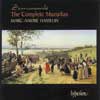Szymanowski (The) Complete Mazurkas
Szymanowski’s elusive treatment of the mazurka here finds the perfect interpreter
View record and artist detailsRecord and Artist Details
Composer or Director: Karol Szymanowski
Genre:
Instrumental
Label: Hyperion
Magazine Review Date: 9/2003
Media Format: CD or Download
Media Runtime: 72
Mastering:
Stereo
DDD
Catalogue Number: CDA67399

Tracks:
| Composition | Artist Credit |
|---|---|
| (20) Mazurkas |
Karol Szymanowski, Composer
Karol Szymanowski, Composer Marc-André Hamelin, Piano |
| Romantic Waltz |
Karol Szymanowski, Composer
Karol Szymanowski, Composer Marc-André Hamelin, Piano |
| (4) Polish Dances |
Karol Szymanowski, Composer
Karol Szymanowski, Composer Marc-André Hamelin, Piano |
| (2) Mazurkas |
Karol Szymanowski, Composer
Karol Szymanowski, Composer Marc-André Hamelin, Piano |
Author: Bryce Morrison
A more potent or original voice than Szymanowski’s is hard to imagine. True, there are key influences to be observed in his rapidly evolving art (Chopin, inevitably, but also Scriabin, Strauss, Reger, the French impressionists and a final rediscovery of Polish roots) yet the results are never less than personal and exotic, and never more so than in the Op 50 Mazurkas.
Chopin’s 58 or so Mazurkas form his most intimate and confessional diary and it is understandable that many other composers (Liszt, Fauré, Debussy), after an initial and uncertain start, shied away from what is after all an intimidating ethnic genre. Scriabin’s 20 Mazurkas are an exception, but unlike Szymanowski’s their style becomes increasingly Russian. Szymanowski’s avowed aim was the revitalising of an exclusively Polish idiom and if the results are initially puzzling – rather like Chopin seen through a distorting mirror – the Mazurkas’ bitter-sweet fragrance (try Nos 1 and 3, both indelibly associated with Artur Rubinstein), and their alternation of introspection and flickering half-lights with an almost crazed exuberance, is increasingly evocative.
Chopin’s spectre may, of necessity, haunt their presence, but so does Szymanowski’s beloved Zakopane and the Tatra mountains, areas central to his late musical thinking; in his own words, a ‘crystallising of elements of tribal heritage’. How significant that Szymanowski’s state funeral ended with a performance by the Obrochta family – whose music had inspired the composer and who had travelled with their rustic violins and bagpipes to Cracow for the occasion.
Such elusive music requires a pianist of rare sensitivity and dexterity and in Marc-André Hamelin Szymanowski has been granted a true champion. A marvel of stylistic inwardness and pianistic refinement, his performances capture the Mazurkas’ alternating whimsy and rigour to perfection. The recording – which also includes the strange (satirical?) Valse Romantique, Four Polish dances and two Op 62 Mazurkas – is of demonstration quality and I look forward to further Szymanowski from Hamelin, notably to the Second Sonata; music which, unlike the Mazurkas, is of outsize virtuoso proportions.
Chopin’s 58 or so Mazurkas form his most intimate and confessional diary and it is understandable that many other composers (Liszt, Fauré, Debussy), after an initial and uncertain start, shied away from what is after all an intimidating ethnic genre. Scriabin’s 20 Mazurkas are an exception, but unlike Szymanowski’s their style becomes increasingly Russian. Szymanowski’s avowed aim was the revitalising of an exclusively Polish idiom and if the results are initially puzzling – rather like Chopin seen through a distorting mirror – the Mazurkas’ bitter-sweet fragrance (try Nos 1 and 3, both indelibly associated with Artur Rubinstein), and their alternation of introspection and flickering half-lights with an almost crazed exuberance, is increasingly evocative.
Chopin’s spectre may, of necessity, haunt their presence, but so does Szymanowski’s beloved Zakopane and the Tatra mountains, areas central to his late musical thinking; in his own words, a ‘crystallising of elements of tribal heritage’. How significant that Szymanowski’s state funeral ended with a performance by the Obrochta family – whose music had inspired the composer and who had travelled with their rustic violins and bagpipes to Cracow for the occasion.
Such elusive music requires a pianist of rare sensitivity and dexterity and in Marc-André Hamelin Szymanowski has been granted a true champion. A marvel of stylistic inwardness and pianistic refinement, his performances capture the Mazurkas’ alternating whimsy and rigour to perfection. The recording – which also includes the strange (satirical?) Valse Romantique, Four Polish dances and two Op 62 Mazurkas – is of demonstration quality and I look forward to further Szymanowski from Hamelin, notably to the Second Sonata; music which, unlike the Mazurkas, is of outsize virtuoso proportions.
Discover the world's largest classical music catalogue with Presto Music.

Gramophone Digital Club
- Digital Edition
- Digital Archive
- Reviews Database
- Full website access
From £8.75 / month
Subscribe
Gramophone Full Club
- Print Edition
- Digital Edition
- Digital Archive
- Reviews Database
- Full website access
From £11.00 / month
Subscribe
If you are a library, university or other organisation that would be interested in an institutional subscription to Gramophone please click here for further information.





